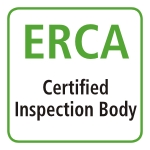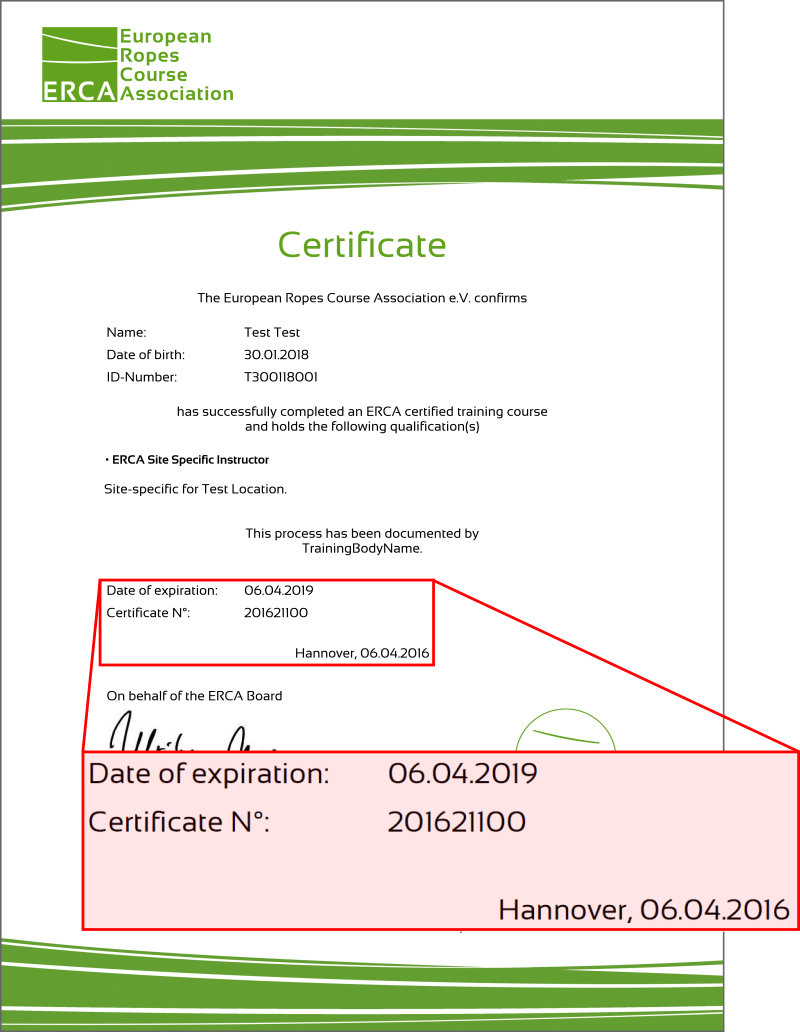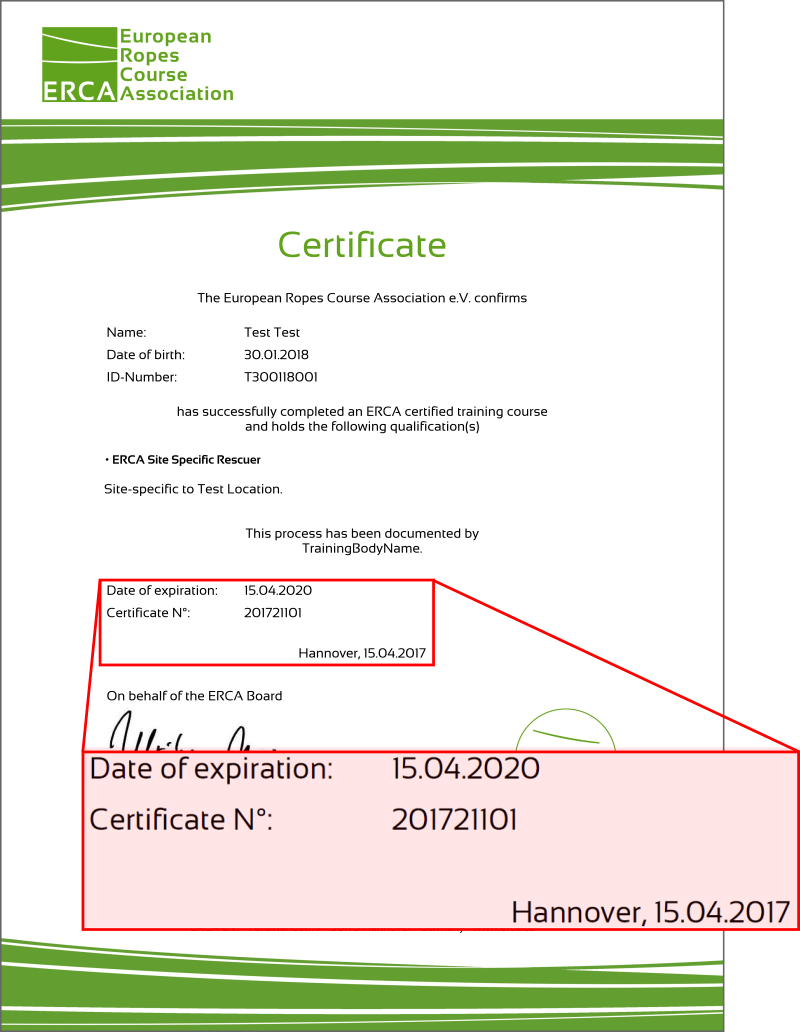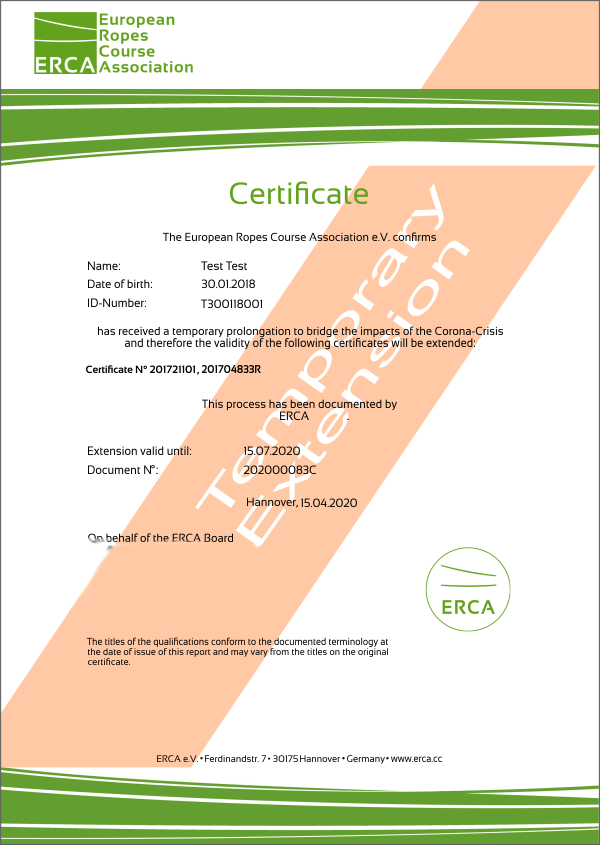Frequently Asked Questions - All FAQs
Please choose a category (Bitte wählen sie eine Kategorie):
|
No faqs found in this category
| |||||||||||||||
|
No faqs found in this category
| |||||||||||||||
|
According to our training and inspection scheme we certify training bodies and inspections bodies (you can check the list of certified bodies by clicking the hyperlinks below).
So in summary for our certification system:
In both cases a certificate (either from the type ''training'' or ''inspection'') with an individual number, an expiration date and the ID of the certified body is issued. So the easiest way to check is as follows: ask the operator to show you the certificate.
A) In our certification system following types of certificates will be issued:
In all cases a certificate (either from the type ''certified training body'', ''certified inspection body'', ''training certificate'' or ''inspection certificate'') with an individual number, an expiration date and the ID of the certified body is issued. So the easiest way to check is as follows: ask to show you the certificate.
Certified bodies are allowed to use the ERCA logo and the ERCA training label resp. the ERCA inspection label. B) In addition to these individual and verifiable certificates we have the standard ERCA membership where members sign a self-commitment. So they voluntarily agree that they work according to the ERCA standards, but have not been individually certified.
ERCA members are allowed to use the ERCA logo only.
The members list is open to the public: http://www.erca.cc/index.php/en/about-erca/members-list-link
| |||||||||||||||
| |||||||||||||||
|
Below sketch shows the route to become an ERCA certified ropes course inspector.
You need to have building experience and must hold certain awards (1-6). For 1 (WAH)see footnote 1 a "IRATA Rope Access Technician Level1 (or higher)" award or another similar award is compulsory. For the awards it is up to you to attend qualifying courses at whatever provider you wish or participating in courses offered by ERCA. If you fulfill all prerequisites you can attend the 5-day inspector training (7). At the end of training you will receive feedback and can work out your personal action plan with help of the trainer (8). Afterwards you have to perform inspections to gain more experience and to prepare (9) before you are required to pass an assessment (10). Footnote 1: For the 'Working at Height'-Award we aplly the following rules: a) Candidates need to present an initial certificate (one of those mentioned in the list); this need to be current and valid; b) During the „inspector training“ the assessors have to observe if they are competent to work safe at height; Those who perform unsafe can be excluded; For further questions please contact: Mrs Sonja Prömm +49-(0)511-95733228 
| |||||||||||||||
|
[Below description/criteria applies to certifications issued in the year 2018 or later.] 
Even if the full responsibilty and liability for carrying out a ropes course inspection keeps with the inspection company, ERCA has developed a label for those inspection companies who are fulfilling a set of certain quality citeria. Inspection companies will be allowed to display the label „ERCA Certified Inspection Body“ which is shown at the right, if following key stages are met: As part of it an inspected ropes course was re-inspected by a 2nd expert, findings were cross-checked with the former inspection report and document samples were checked to make sure that management pocedures are in place like mentioned in the self-commitment from the inspecton company (see below). o
Working-At-Height Award o PPE Inspection Award (at least training of 2 days duration, incl. assessment) o Wire Rope Inspection Award (at least training of 2 days duration, incl. assessment) o Wood Pole Inspection Award (at least training of 3 days duration, incl. assessment) o
ERCA Inspector Award (includes assessment) o … construction experience with pole- and tree-builts with at least 50 days; o
… comprehensive experience for carrying out operational
inspection procedures; o Measures to ensure continous professional development § Inspectors must attend two CPD days within a 3 years period. One opportunity is to attend the the yearly meeting of the expert group inspection. § The leader of an inspection body is responsible that their inspectors are competent to work at height; The leader has to apply the usual measures for employers (CPD, instructions, training); § The leader or one delegate of the inspection body needs to attend the ERCA ‘Expert Group Inspection’ at least once over two years. § Each inspector carry out a minimum of 5 inspections per year. o Duty to hold a liability insurance § The inspection company is liable to conclude and hold an appropriate liability insurance to the services the inspection company offers (with an insurance sum of minimum EUR 5000000 per case). o The inspection body has to make use of the documentation database online software (Intranet). Doing so it is ensured …: § ... that ERCA can pick samples for the next upcoming audit process; (Note: ERCA will not review nor check if reports or findings are correct.) § ... that reports are stored in a 2nd place (protection against data deletion); o Procedures in terms of data protection § The inspection company undertake not to grant access to the documentation to anyone other than the persons entrusted with the execution of the inspection and documentation with the process. § Inspection companies have the duty to inform their customers about the fact, that data will be submitted and saved online while making use of above mentioned online documentation database and that email addresses will be subscribed to ERCA‘s emaillist for certificate holders. Certificate holders can unsubscribe at each time. § The inspection company need to file/enter data while making use of above mentioned online documentation database and to prepare certificates. Doing so the customer e-mail address will being added to a mailing list, by means of which ERCA internal information and security relevant reports are sent. § Customers need to be made aware by the inspection company that data can being used from ERCA for the purpose of carrying out audits related to the inspection company. o Procedures for Quality Control § The inspection body allows ERCA to carry out customer surveys on a regular basis (online survey form). § The inspection body agrees that ERCA is allowed to carry out re-inspections whenever ERCA wants and with no in-advance notice to the inspection body. ERCA can pick the ropes courses for re-inspection from the documentation database online software. The procedure will always be the same and is explained in audit paperwork. § The inspection body agrees that ERCA is allowed to carry out a re-audit of the inspection body latest over all 3 years. § The inspection body control and measure the performance of the inspectors. o Procedures for Office Management § Archiving of all paperwork for peridical inspections carried out, for minimum the last 10 years. § Traceability of inspection reports, certificates and the relevant customers. § Upholding a procedure for correction/ recall of reports/certificates for such a potential case in which certificates were issued by mistake or with containing mistakes. o
Procedures for the Practical Inspection § Start of an inspection (Briefing with the operator) · Meeting the ropes course operator · Acquiring the relevant documents from the operator - assuming the inspector has not received them prior to inspection · Document Checks (Design Calculations, Drawings) · Checking if there are any specific areas of concern that the inspector needs to pay particular attention to during the inspection process? · Checking if there are there any elements which carry a particular risk? · Checking if the inspector should be aware of any particular incidents in the past? · Ensuring a rescue plan is in place for the duration of the inspection. · Adhering to national laws and WAH regulations. § Inspection work · Functional test of ropes course elements/activities if possible (e.g. exept large group elements) . · At height inspection of all elements of the construction. § Completing the inspection · Final discussion with the client; passing on relevant information. · If elements need to be placed out of action: Advise the name and location of the element to the operator and asking the operator to counter sign the relevant documentation. · Informing the operator about the next steps and or Actions. o Procedures for the compilation of a Report & Documentation § A final report has to be completed and submitted to the operator within 30 days after the inspection. If this is not possible e.g. for research reasons the customer has to be informed about the delay in between the 30 day period. § The inspection body adheres to and states unambiguously on the report that the inspection was carried out according to the ERCA – Inspection criteria’s, manual and standards. § Inspection reports must contain clear findings and advice to operators what was ´passed´/ ´failed´/´deferred´ and what repairs are mandatory. Photographs are to be made and must show the identified defects. § More in detail, a report shall contain ... · … identification of the issuing body. · … place(s) and date(s) of inspection. · … identification of the item(s) inspected. · … name, address and signature of the inspector. · … a statement of conformity where applicable . · … a record of all defects found. A note stating that any safety defects which are found shall be resolved to the satisfaction of the inspection body before the course is used. · … information on what has been omitted from the original scope of the inspection. · … a statement that the inspection report should not be reproduced, except in full. · … if applicable, a notification about the fact, that arboreal assessments shall be carried out at least once per calendar year and within a maximum interval of 15 months as detailed in EN 15567-1:2015, Annex A. [Below description/criteria applies to certifications issued in the year 2018 or later.] The certificate shown at the right will only be issued by ERCA once above mentioned points were actually met on the day of the audit. The certificate keeps valid as long as that status was not revoked actively nor a re-audit found contradicting reasons. As long as the certificate is valid, you will find the inspection company listed on the ERCA website at: https://www.erca.cc/index.php/en/training-and-inspection/inspection#bodies Flagrant breach of inspection procedures or quality criteria defined by ERCA will in-validate the certificate. [Below description/criteria applies to certifications issued in the year 2018 or later.] Inspection companies who would like to be „ERCA Certified Inspection Bodies“ for the scope of „Periodical Ropes Course Inspections“ must comply with all criteria mentioned above. Those who would like also being certified for the scope of „Inaugural Ropes Course Inspections“ and/or "Modification Inspections" need to meet the following additional requirements:
[Below description/criteria applies to certifications issued in the year 2018 or later.] ERCA has the right to carry out following checks on a random basis: and/or and/or and/or [Below description/criteria applies to certifications issued in the year 2018 or later.] For reason that the full responsibilty and liability for carrying out a ropes course inspection keeps with the inspection company, it is always the inspection company who issue the certificate and a comprehensive inspection report. The certificate template looks like shown here at the right and operators should receive the certificate together with the inspection report not later than 30 days after the inspection was completed. Please note that you have to check and observe the results of the inspection, highlighted in the inspection report. All action points must be fullfilled within the agreed timescale to validate the certificate. An „ERCA Certified Inspection Body“ will make use of an online documentation software and will collect, process and store following data using the software. Due to this fact also the ERCA Web Administrator Team can access those data. All persons involved undertake not to grant access to the documentation to anyone other than the persons entrusted with the execution of the inspection and documentation with the process. Certificate holders can unsubscribe the e-mail-list at each time and can request to get their data deleted, but have to understand that services cannot being provided any longer as those data are crucial to process inspections. | |||||||||||||||




